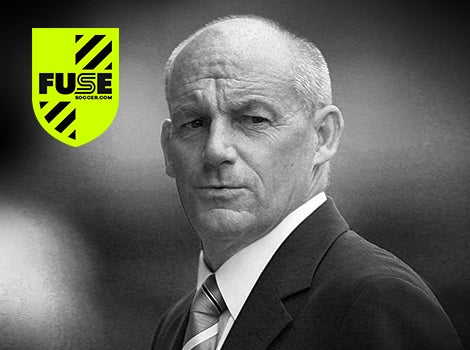Steve Coppell is a professional football manager, former Manchester United player and ex-English International. Steve represented England in World Cups and the European Championships, has managed a number of teams including Crystal Palace, Manchester City, Reading, Brighton Hove and Albion and many others, and is credited with having an eye for scouting talent such as Ian Wright, Alan Pardew and Andy Gray. Steve recently managed ATK in the Indian Super League and had plenty of wisdom to share about managing in India and less-dominant footballing countries.
Interviewing Steve was a real pleasure. His enthusiasm and depth of sporting knowledge was tangible from the first question we asked him.
FUSE had the honor of speaking with him about his experiences in professional soccer, the present and future state of soccer in the US, as well as the changes necessary to adapt to the modern game.
Enjoy the interview below!
Can you touch on some of the differences between the modern game and when you were playing professionally?
Every sport evolves. The biggest difference is with game preparation and recovery. With improvements in sport medicine and science being the critical changes that have been implemented - specifically regarding sleep, nutrition, and recovery.
The game is now catered to bring out the best in individuals for entire seasons. I remember when Liverpool won the league with just 14 players in the year before I was playing, which is now an impossibility.
It's a good time to be a professional footballer. If you have the ambition and the drive, there are now much better preparation, nutrition and medical procedures to help lengthen a career in the sport.
How would you rate the quality of players in the league now in comparison?
I’d say the overall skill levels are comparable. I was part of a generation that was developed in the streets. It was a much more physical game when I was playing, people could get away with more. Tenacity and physicality were valued differently because there was no VAR, etc to combat it. Most players today are brought up solely through organized coaching, and it reflects in the generational style of play.
Can you touch on the quality and challenges of managing in the Indian Super League?
The ISL is a changing environment - they are trying to get more Indian players every year. At ATK we had 14 Indian players and 7 foreigners. Per the league rules, only 5 foreigners can play at once. A few years ago you were allowed 6 foreigners.
There is something to be said for these rules, and the benefits are coming to fruition. A couple years ago they were ranked 150 in the world and now they are in the 90s. I admire India because, in any sport, not just soccer, you must be born in India and have a Indian passport. Their progress is shown and the ISL has helped develop the education of the sport in India by combining foreign players with Indian players who are naturally keen to learn. Over the years, I think they will climb the world ladder for soccer.
While it is largely still a Cricket culture by tradition, there are plenty of football hotbeds bubbling.
Yes, and not to mention the population and sheer number of potential footballers.
People assume that there are so many people in India so it will translate, but there are very poor training facilities in India and that plays a big part in the development. There are not many good facilities and training grounds across the country, and there is massive overuse of the pitches there are. Until they get more development pitches, you won't see a massive skill level increase.
How have you had to adapt your managerial style over the years to combat the evolution of the modern game?
When I first started in management, English managers were called "Boss". I literally did everything when I started - video analysis, contract management, scouting etc. I did everything.
It’s not like that anymore. Managerial duties have narrowed in scope and it's now highly specific - you pick the team but there are specialists now in just about every aspect of the organization. You are less of a "Boss". This has changed the attitude of dressing rooms, and now players will question your decisions and tell you off. It's been a huge metamorphosis in the Boss role, you are now a marginal leader of a diverse group of men and much less of a dictator of sorts.
What are some of the managerial challenges you had to combat being in India?
Communication was the biggest one. You'd assume that communication would be simple in India, but there are over 30 major languages through the provinces, so even Indian players can have difficulties speaking to each other. We also have Spaniards, Brazilians, etc so that can be a difficult process.
Facilities is the second biggest issue, and travel can be brutal in a big, business-aggressive country such as India. Sometimes travelling three hours on a bus just to train for a match might not be worth the time and energy. Logistically, travel can be brutal. For example, in a memorable away match, our team had to split flights on two different days to get home! As you can imagine things like this can throw off team rhythm and training.
You’ve had such a successful playing and managerial career - who are your biggest influences that have helped shape your management/ playing style?
I was very fortunate to be brought up in Liverpool where my formative years were in the start of the Bill Shankley and Bob Paisley era. Liverpool was winning everything every year and to be surrounded by that mentality and culture helped shape the way I played the game.
Tommy Dougherty (manager who signed Steve for Manchester United). I only worked under him for two years but he was a major influence. He reinforced the idea that, having been a player, you know what works and I tried to emulate his personality. I learned very early as a coach that you can't hide who you are , you can't be false. I always try to be myself.
"Don't be a phony, be yourself, because it will come out eventually."
- Steve Coppell
Can you walk me through the process of signing someone like Ian Wright? How did you develop such a keen eye for talent?
Pure Luck! When I was managing at Crystal Palace we had no money, so we were looking for non-league players.
I used to invite all the local, non-league managers into the training ground and ask them if you ever want to watch training or have a cup of tea and chat. They’d come by and we'd talk about emerging players. It was free scouting!
Billy Smith came in one day, he managed a local non-league team, and said we've got a brilliant young 22 year-old kid who was never picked up by any clubs. It was highly unusual that talent wasn’t picked up professionally by the age of 22. It was during the summer when I sent a scout to watch them train. I was just checking him out for due diligence, and wasn't expecting anything special.
The scout came back and said he looks very good, so we invited him to train with us. Within 3 days of him training with us, we offered him a contract. We saw a player who had the skill to play for the International team. Left foot, right foot, quick and good in the air. He ended up having a massive career and now he's on TV.
It was mostly luck based on sound thinking. We always utilized non-professional league scouting through coaching and scouting contacts. We signed Alan Pardew for $6m at 26 years old from a non-league club! Also, Andy Gray and many others came from non-league scouting missions. We just couldn't afford players, which forced us to think outside the box.
Can you speak on the Economics degree from Liverpool and how that has impacted your career in football?
I've always said, the benefits of my economics degree is that people have the impression that I'm intelligent. Stereotypically, people don't see footballers as intelligent.
Footballers are more wise to the ways of the world, not necessarily book smarts or highly educated. It was doable then, but now it would be highly difficult to combine a university degree with a footballing career in the academies where you get signed around 6 or 7. To be fair, it hasn't directly helped me in football.
Both my sons went to college in the USA. My oldest went to soccer in North Carolina, but they practice more than my players do in college because we have more games! The college system seems fine in the USA!
In your opinion, what are the most critical fundamental skills to be teaching at the youth level?
Control, pass and move. Those are the biggest three things.
Control is the ultimate sign of quality in a player, it's the number 1 thing. If the ball comes in at any angle, speed, size - your ability to control that ball is everything.
The quality of a pass isn't just about keeping possession, it's about giving the person receiving the pass the ability to do something with it.
Movement is so important. Being able to find space in a congested penalty area and knowing which space to occupy on the pitch at the right time. Those are the most fundamental skills
If you had the chance to go back and tell your 18-year-old self one piece of advice - what would it be?
I'd tell my 18 y.o self - "Get Back Up!"
When you lose or suffer a defeat - do you look at the floor and wallow or are you looking to improve and do better next game?
Defeats have weighed too heavily sometimes in my career, but I've come to realize there is always a next game.



Leave a comment: